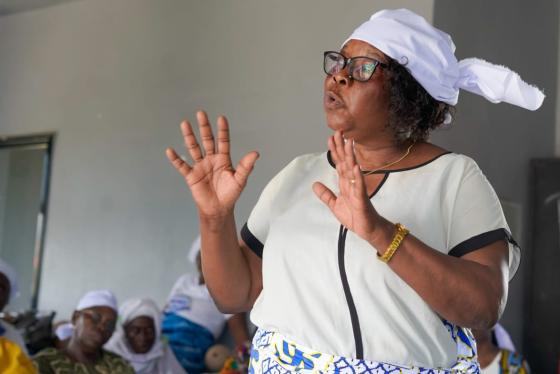Visiting South Sudanese Delegation Thrilled by Liberia’s Democratic Progress

Hon. Charity Yakob Kimbo, member, National Transitional Legislative Assembly, the Republic of South Sudan
— “Who else to learn from than your eldest sister?”
A 16-member South Sudanese delegation, predominantly women, is concluding a week-long learning visit to Liberia to glean insights into the country’s successful electoral practices, women’s political participation, and the journey through peace. The team comprises representatives of the Government of the Republic of South Sudan, civil society, and media practitioners, and aims to understand Liberia’s transition from war to peace.
The delegation’s visit, supported by UN Women (South Sudan and Liberia), comes as South Sudan prepares for its inaugural democratic election since declaration of independence.
The delegation is keenly observing how Liberian women have navigated the political landscape to assume influential leadership roles.
In an effort to contribute to peaceful and credible elections, they held deliberations with key electoral stakeholders to integrate gender-sensitive lessons into their electoral processes back home.
“We want to learn how Liberian women have managed to be so successful in politics. We want to know how they are navigating the political terrain that is so tough on the African continent,” Hon. Charity Yakob Kimbo, a Parliamentarian of the South Sudanese Transitional National Legislature Assembly, told the Daily Observer in an interview after a meeting with CSOs in Monrovia.
“We have heard a lot of success stories about Liberian women politicians and how peaceful and orderly the country’s electoral processes have been. We want to learn how these are happening here so that we can take the strategies back home.”
Parliamentarian Kimbo, who is also the Secretary for Finance for the South Sudanese Women Parliamentary Caucus, said that Liberia is fast becoming a model for democracy and good governance on the African Continent and, as such, there is no better place for South Sudan to draw its lessons on elections from than here.
“We and Liberia also share some unique connections. Liberia is the oldest independent nation in Africa while we are the youngest… who else to learn from than your eldest sister?” she asked rhetorically. “Both countries have also experienced civil wars. Coming from such a background as us and doing so well in conducting elections is so admirable. We want to know how Liberians are doing this because this is what we also want in our country. The level of political maturity we have heard and read about in this place is enviable. We want to learn from your experiences.”
Photo: Members of the delegation in a group photo with some Liberian CSOs officials
Given that South Sudan’s upcoming election will involve first-time voters, the delegation is exploring the nuances of civic voter education and effective candidate messaging. They are engaging with Civil Society Organizations (CSOs) and election stakeholders in Liberia to exchange experiences and gather insights on best electoral practices, particularly regarding temporary special measures, inclusivity, and capacity building for women in political leadership.
“We want to know the roles CSOs played in the elections. How were they engaging the politicians, the electorates, and the elections commission,” Jackline Nasiwa, Executive Director, Center for Inclusive Governance, Peace and Justice said during the meeting. “The lessons we will learn from here could help to capacitate our civil society organizations back home.”
The fact that both Liberia and South Sudan faced prolonged periods of civil unrest and violence makes this learning visit particularly relevant. The delegation seeks to learn from Liberia’s experience in conducting three post-war elections that resulted in two peaceful transfers of power, paving the way for harmonious co-existence in Liberian society.
“We want to know how Liberia has managed to achieve this. We all know elections in Africa are contentious and ethnic or tribal-driven, but Liberia has been able to achieve this three times with no conflict. The people are living peacefully side by side,” Ochaya James Philip Kulong, a journalist and Executive Director of the National Press Club of South Sudan, said. “We are nervous as we head to ours in December. We don’t know what the outcome will be.”
He said it is the nervousness and the fact that millions of South Sudanese don’t know what post-election will be like that prompted their journey to Liberia to get firsthand information about how Liberians achieved those milestones.
“I’m a journalist and I want to know the roles that the media played in the electoral process. We want to take back their experiences, their lessons learned, and some challenges they encountered during the elections so that we can have the opportunities to find our way around the challenges,” he said.
Through their visit to Liberia, the South Sudanese delegation aims to glean valuable lessons from Liberia’s electoral journey and enhance their electoral processes as they embark on a significant milestone in their democratic evolution.
